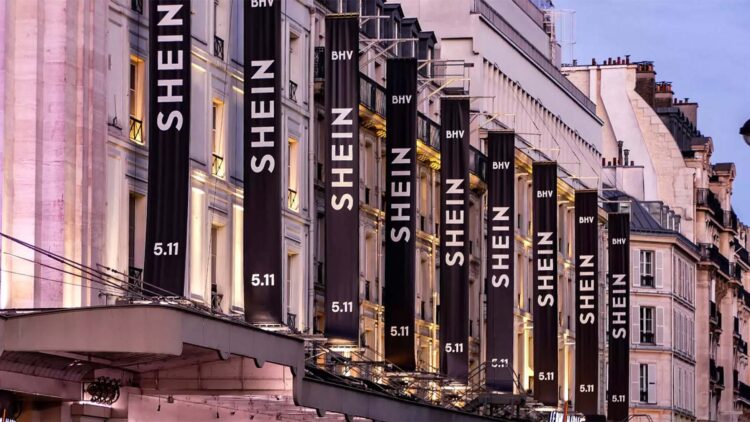The BHV historical building in the heart Paris, has become the center of a big controversy. The opening of the first physical Shein store in France—and the world—has provoked a wave of critics and manifestations.
The brand that’s known worldwide by it ultra fast fashion model, presented a new space of nearly 1.000 square meters as an opportunity: 50 new jobs and more visitors for the mall. However, politics, local merchants and citizens don’t see it like that.
Protests and controversy in the heart of Paris
The same day the shop opened, the streets facing the BHV Paris where filled with banners and chants: “Shame on Shein,” they said. The protestants accused the company of pushing a model that enhances massif and cheap consumption at the expense of sustainability.
The controversy grew even more when, days before inauguration, child-looking sex dolls were discovered sold on their website. This fact opened a judicial investigation and the intervention from the Ministry of Finance of France, who warned that the company will be banned if something like that happened again.
Shein, founded in China in 2012 and currently based in Singapore, responded by saying that it was a “failure in its internal processes” and promised to collaborate with the French authorities. They also confirmed to have dismissed the sellers involved in the situation and forbidden definitely this kind of products. According to Reuters, the platform had over 27 millions of monthly users in France between February and July this year.
Criticism for pollution and exploitation
The harder critics agains Shein are not about dolls though, they go directly about the way this business work. The ultra fast fashion model consist in producing enormous amount of cheap clothes, that are sent directly from the factories in China to 150 countries. This system, has also being painted out as home to labor exploitation, overworking hours and, in some cases, use of child labor. In their own 2023 sustainability report, the company acknowledged having found two cases of child labor among its suppliers.
Furthermore, the environmental activists denounce the serious textile pollution caused by the brand: their low quality fabrics cannot be recycled, and the dyes are highly toxic. Finally, there’s also overproduction since thousands of people buy new clothes every month, huge waste is been generated and the environmental impact that’s creating will be difficult to undo.
France reacts to the ultra fast fashion model
The legislators approved a proposal for a sustainable fashion law, which would fine fast fashion and ultra fast fashion companies if they do not meet ecological criteria. This law could also forbid the publicity of platforms like Shein or Temu, which upload more than 1,000 new products a day. In the case of Shein, the number is even more alarming: up to 7,200 new daily articles!
With this measure, France is at the head of the regulation of the sector, sending a strong message to brands that prioritize speed and low cost over ethics and sustainability. But the brand is making quite a statement too by putting the first shop at the very capital of fashion, where Channel and Louis Vuitton started.
Making fashion accesible for everyone
Not everyone can buy expensive clothes, and this is why the fast fashion works so well, they allow people to dress well and feel good with themselves no matter what their budgets are. But how much are you really saving if the clothes only last for a few months before the fabric gives up? How long until you have to restock and spend more?
And don’t get me wrong, I’m a fashionista myself, but ultra fast fashion seems to just be pushing capitalism to a whole other—and very dangerous— level.

